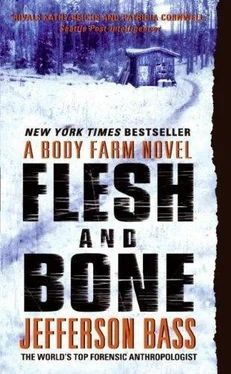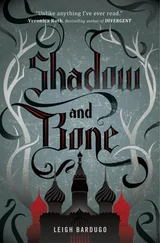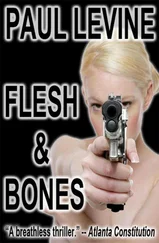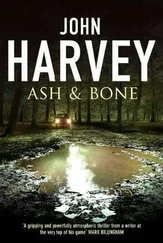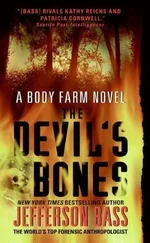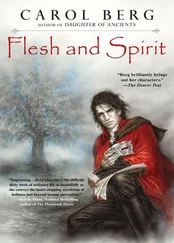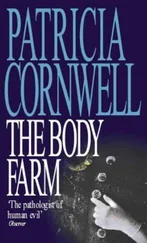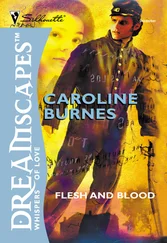Jefferson Bass - Flesh and Bone - A Body Farm Novel
Здесь есть возможность читать онлайн «Jefferson Bass - Flesh and Bone - A Body Farm Novel» весь текст электронной книги совершенно бесплатно (целиком полную версию без сокращений). В некоторых случаях можно слушать аудио, скачать через торрент в формате fb2 и присутствует краткое содержание. Год выпуска: 2007, Жанр: Детектив, на английском языке. Описание произведения, (предисловие) а так же отзывы посетителей доступны на портале библиотеки ЛибКат.
- Название:Flesh and Bone: A Body Farm Novel
- Автор:
- Жанр:
- Год:2007
- ISBN:нет данных
- Рейтинг книги:3 / 5. Голосов: 1
-
Избранное:Добавить в избранное
- Отзывы:
-
Ваша оценка:
- 60
- 1
- 2
- 3
- 4
- 5
Flesh and Bone: A Body Farm Novel: краткое содержание, описание и аннотация
Предлагаем к чтению аннотацию, описание, краткое содержание или предисловие (зависит от того, что написал сам автор книги «Flesh and Bone: A Body Farm Novel»). Если вы не нашли необходимую информацию о книге — напишите в комментариях, мы постараемся отыскать её.
Flesh and Bone: A Body Farm Novel — читать онлайн бесплатно полную книгу (весь текст) целиком
Ниже представлен текст книги, разбитый по страницам. Система сохранения места последней прочитанной страницы, позволяет с удобством читать онлайн бесплатно книгу «Flesh and Bone: A Body Farm Novel», без необходимости каждый раз заново искать на чём Вы остановились. Поставьте закладку, и сможете в любой момент перейти на страницу, на которой закончили чтение.
Интервал:
Закладка:
The next one on the right was a three-story Victorian with an immense porch that stretched the width of the house and then wrapped around one side. Two of the bedrooms on the second floor had covered, columned balconies as well, and the third floor-which might have been servants’ quarters a century ago-was a marriage of slate roof and dormer windows. The house was a microcosm of the neighborhood itself: a work in progress; a study in transition. One side of the façade was freshly painted, its cedar shakes an elegant blue-gray with white trim; the other side was sheathed in a tower of scaffolding through which I glimpsed a patchwork of peeling paint and new, unpainted shakes.
A minivan was parked beside the house, beneath a porte cochere whose roof was supported by fluted white columns. “Now that’s what I call a carport,” said Art. “They just don’t make ’em like that anymore.”
“They don’t,” I agreed, “but I bet your heating bill in the winter is about one-tenth what theirs is. Look at all those windows with all those little bitty panes of glass. Some of ’em missing, too, looks like. Probably no insulation in the walls, either-I bet when the winter wind blows, you can feel it inside the house.”
“Cuts down on the germs,” he said. “Toughens up the immune system, too.” He parked at the curb and cut the engine. “Okay, you ready?”
“No.”
“Me neither. I never am, for this kind of thing. You just have to take it slow; don’t dump too much on them at once.” He took a deep breath, and I did the same, and then we walked slowly up the sidewalk and climbed the porch stairs.
The front door was a massive slab of fine-grained oak and bubbly, rippled old glass. The wood-hand-carved in a motif of leaves and vines-had been meticulously stripped and refinished to a lustrous golden hue. The glass was screened on the inside with a curtain of white lace dense enough to give privacy but sheer enough to let in plenty of light. The doorbell, like the door, was clearly original: a keylike knob set into the center of the door, just below the panel of glass. Art gave it a brisk twist, and it responded with a fusillade of clattering dings. I jumped, and Art smiled. “Sorry, I guess I got a little carried away,” he said. “They don’t make ’em like that anymore, either.”
Inside, we heard the distant clatter of hard-soled shoes on hardwood floors. They drew nearer, then stopped, and a manicured hand pulled back the lace curtain. A woman who appeared to be in her mid-thirties peered out at us. Her expression was somewhere between neutral and slightly guarded-about what you’d expect to see on the face of a woman who looks out her front door to find two strange men on her porch. Then I saw something register in her eyes, and her face collapsed into panic and despair. She wrenched open the door and put a trembling hand up to her mouth. “Oh God,” she whispered, “what’s happened now?” My heart went out to her, and I suddenly grasped the full import of what Art had said on the phone: some wounds never heal; some ghosts haunt you forever.
“Everything’s fine, Mrs. Scott,” Art said quickly. “Nothing’s wrong, I promise. We just have some information we thought you might appreciate hearing from us.” She looked from Art to me and back again. “May we come in?”
She gave her head a quick shake, as if shrugging off a bad dream. “Yes. Of course. Forgive me.”
We stepped into a soaring entry hall. On the right side, a wide oak staircase ascended to a broad landing halfway to the second floor, then made a left turn and topped out at what looked to be a sitting area. On the foyer’s left side, a wide columned archway opened into a parlor that could have been transported from the 1890s. Unlike the house’s half-renovated exterior, the interior-at least, what little I had seen so far-looked completely restored. She motioned Art and me to a velvet-covered sofa, its back formed of three ovals framed in walnut. She took a wingbacked armchair, but rather than settling into its embrace, she perched tautly on the front edge.
Art introduced himself, then me. She nodded as he described my work as a forensic anthropologist, and said, “I’ve read about you. Your work sounds interesting and very important.” There was a hint of a question in her eyes and her voice as she said it.
I glanced at Art; he gave me an almost imperceptible nod: permission to speak. “A man was murdered a couple of weeks ago in Chattanooga,” I said. “There was no identification on the body. The authorities down there asked if I could help figure out who he was and when he was killed.” Mrs. Scott’s eyes flitted back and forth as she scanned the universe of possibilities, trying to see where this might be leading.
“Ma’am, Dr. Brockton and I have just identified the body of that man,” said Art. “It was Craig Willis.” She inhaled sharply, and both hands flew to her mouth this time. Her eyes were wide, and I could almost swear I felt electricity crackling from them. Her hands began to shake, and the shaking traveled up her arms and into her shoulders and face and chest, and she dropped her face into her hands and began to sob-soundlessly at first, then with a sort of ragged, gasping noise which gave way to a high, sustained whimper that was more animal than human. I remembered a line from a movie-“the sound of ultimate suffering”-and I knew that was the sound I was hearing. I looked helplessly at Art, then pantomimed a question- Should one of us go to her? — but he shook his head slightly, motioning for me to sit tight.
She finally wound down, in a series of shuddering aftershocks, and lifted her head, staring out bleakly between her fingers. When she looked at Art, he reached into his jacket pocket and pulled out a clean handkerchief, which he held out to her. She wiped her eyes, her cheeks, and her dripping nose, then blew into it twice. By now the handkerchief was sodden, so I handed her mine, too. She repeated the maneuvers, looked at the mess she’d made of both hankies, and gave a sort of embarrassed half laugh. Then she drew a series of deep breaths, as if she had just sprinted half a mile. “I have imagined…this scene…a thousand times,” she managed to say. “A thousand different ways. Dreamed it, day and night. Lived for it, when I couldn’t hang on to anything else to live for. Prayed for it.”
“Yes, ma’am,” said Art. “I expect you have.”
“So as much as I’ve rehearsed it, why does it still feel like my insides have just been torn out?”
“Because they have,” he said. “This time it’s not make-believe.”
“God, we’ve worked so hard to put that behind us,” she said. “Months and months of therapy. For Joey. For Bobby. For me. For me and Bobby together. For all three of us together. The abuse damn near killed us; now, the recovery’s about to bankrupt us.”
“I understand,” said Art. “I’m sorry. I know it might not be much consolation, but this case-Joey’s case-inspired us to work harder and smarter to catch guys like Craig Willis. We’ve created a new task force to catch people who use the Internet to target children or trade child pornography. If we can catch them in cyberspace, we can charge them with federal crimes. It’s a small program right now, but it will only get bigger. And we’re closing in on several of these people right now.”
She looked both distressed and grateful to hear that.
Art checked his watch. “It’s about three o’clock right now,” he said. “What time will your husband be home from work?”
“Probably not till seven or eight. He’s working a lot of overtime-that’s how we’re paying those therapy bills.”
“Would you like us to come back this evening and tell him about this?”
She shook her head. “No,” she said. “He’ll be upset-he’ll need to be upset, just like I did-and it would be hard for him to do that with you. If I tell him, I can hold him while I tell him, and maybe that will make it easier for him. More bearable, somehow.” She smiled slightly. “He’s a pretty manly man,” she added. “He might actually hit you if you told him. With me, I think maybe he’ll be able to cry instead.”
Читать дальшеИнтервал:
Закладка:
Похожие книги на «Flesh and Bone: A Body Farm Novel»
Представляем Вашему вниманию похожие книги на «Flesh and Bone: A Body Farm Novel» списком для выбора. Мы отобрали схожую по названию и смыслу литературу в надежде предоставить читателям больше вариантов отыскать новые, интересные, ещё непрочитанные произведения.
Обсуждение, отзывы о книге «Flesh and Bone: A Body Farm Novel» и просто собственные мнения читателей. Оставьте ваши комментарии, напишите, что Вы думаете о произведении, его смысле или главных героях. Укажите что конкретно понравилось, а что нет, и почему Вы так считаете.
